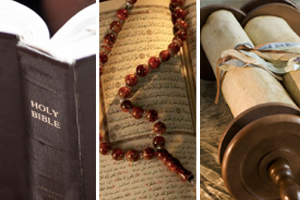Applying God’s Law: Religious Courts and Mediation in the U.S.

Pew Research Center Report April 8, 2013. Across the United States, religious courts operate on a routine, everyday basis. The Roman Catholic Church alone has nearly 200 diocesan tribunals that handle a variety of cases, including an estimated 15,000 to 20,000 marriage annulments each year. In addition, many Orthodox Jews use rabbinical courts to obtain religious divorces, resolve business conflicts and settle other disputes with fellow Jews. Similarly, many Muslims appeal to Islamic clerics to resolve marital disputes and other disagreements with fellow Muslims.
For the most part, religious courts and tribunals operate without much public notice or controversy. Occasionally, however, issues involving religious law or religious courts garner media attention. The handling of clergy sexual abuse cases under Catholic canon law, for example, has come under scrutiny. Internal church proceedings aimed at disciplining Protestant clergy have generated news coverage because they have highlighted debates over same-sex marriage and openly gay ministers. There also have been public protests against Orthodox Jewish men who refused to grant their wives a religious divorce. Meanwhile, bills aimed at banning the use of Islamic (sharia) law – or at restricting the application of religious or foreign law in general – have been introduced in more than 30 state legislatures. (For more details on those legislative initiatives, see the map graphic “State Legislation Restricting Use of Foreign or Religious Law.”)
Disputes over the laws of various religious traditions have occasionally made their way into U.S. civil courts, but the Supreme Court consistently has ruled that judges and other government officials may not interpret religious doctrine or rule on theological matters. In such cases, civil courts must either defer to the decisions of religious bodies or adjudicate religious disputes based on neutral principles in secular law. For example, in recent years the Episcopal Diocese of Virginia has battled in state court with several congregations over control of buildings, property and funds after the congregations voted to join more theologically conservative branches of the worldwide Anglican Communion. So far, the cases have been decided in favor of the diocese using contract and real estate law rather than church law.
(Introduction, notes omitted.)